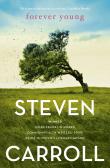 5686420822028855344.jpg
5686420822028855344.jpg
 5686420822028855344.jpg
5686420822028855344.jpg
'The latest novel by acclaimed novelist Steven Carroll, winner of the Prime Minister's Award and the Miles Franklin Award.
'And is nostalgia not so much a longing for a place or a time, as a longing for youth itself?'
'Forever Young is set against the tumultuous period of change and uncertainty that was Australia in 1977. Whitlam is about to lose the federal election, and things will never be the same again. the times they are a'changing. Radicals have become conservatives, idealism is giving way to realism, relationships are falling apart, and Michael is finally coming to accept that he will never be a rock and roll musician.
'A subtle and graceful exploration of the passage of time and our yearning for the seeming simplicities of the past, Forever Young is a powerfully moving work - clear. beautiful, affecting - by one of our greatest authors.
'Carroll ... transmutes the grey facts of daily life into light and luminous art.' Geordie Williamson, the Australian.' (Publication summary)
Epigraph:
When I was a child, I spake as a child, I understood as a child, I thought as a child: but when I became a man, I put away childish things. –Corinthians, 13:11
My heart leaps up when I behold
A rainbow in the sky:
So was it when my life began;
So it is now I am a man;
So be it when I shall grow old,
Or let me die!
The child is father of the man...
William Wordsworth
'Steven Carroll has now written five novels based on his experiences as a child in Glenroy, the suburb on the northwestern edge of Melbourne. The first, The Art of the Engine Driver, was a kind of hymn to the people of the raw suburbs of the 1950s, a suburban Under Milk Wood, and a determined correction of the dismissal of suburban life as philistine and unworthy of attention. Central to the novel was a young boy called Michael and his parents, the engine driver Vic and the sales demonstrator Rita. The novel followed their thoughts and memories over a single summer night, as they walked to and from a neighbourhood party, in a series of meditations broken only by the brief drama of the party. The Gift of Speed and The Time We Have Taken returned to these people, slowly building a fuller picture of the limits on their lives and ambitions, and shifting focus to later years (1961, 1967). Vic and Rita’s changing relationship provided the main structural strand, but each novel commenced in the context of a public or national moment – the 1961 tour of the West Indian cricket team for The Gift of Speed, the growing support for Gough Whitlam’s Labor Party for The Time We Have Taken. Michael’s increasing independence from his parents and his growing understanding of the world around him made his consciousness dominant by the third novel.' (Introduction)
'Steven Carroll has now written five novels based on his experiences as a child in Glenroy, the suburb on the northwestern edge of Melbourne. The first, The Art of the Engine Driver, was a kind of hymn to the people of the raw suburbs of the 1950s, a suburban Under Milk Wood, and a determined correction of the dismissal of suburban life as philistine and unworthy of attention. Central to the novel was a young boy called Michael and his parents, the engine driver Vic and the sales demonstrator Rita. The novel followed their thoughts and memories over a single summer night, as they walked to and from a neighbourhood party, in a series of meditations broken only by the brief drama of the party. The Gift of Speed and The Time We Have Taken returned to these people, slowly building a fuller picture of the limits on their lives and ambitions, and shifting focus to later years (1961, 1967). Vic and Rita’s changing relationship provided the main structural strand, but each novel commenced in the context of a public or national moment – the 1961 tour of the West Indian cricket team for The Gift of Speed, the growing support for Gough Whitlam’s Labor Party for The Time We Have Taken. Michael’s increasing independence from his parents and his growing understanding of the world around him made his consciousness dominant by the third novel.' (Introduction)